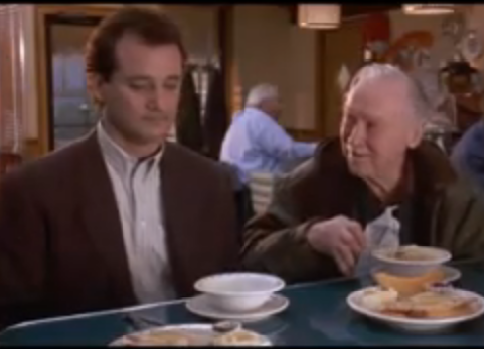I saw a guy experiencing homelessness this morning, and I have seen him before.
Often he has a shopping cart with 4 or 5 suitcases on it. He dresses in brown, or maybe his suit jacket is just covered with the product of months or years of street life.
There were no suit cases this morning.
The man sat against the base of a concrete box in the train station, rocking with his hands between his thighs for warmth.
My cheeks were pierced with cold, so his must’ve been numb–his beard looked thin and disheveled, not helpful.
His rocking was sad; his posture like a vertical fetal position wishing for the comfort of the womb.
[An expanded version of this essay appears in my book Kneading Journalism]
Wanting to help
I walked into the pastry shop nearby.
I wanted a quick breakfast on my way to the radio station, but I couldn’t buy my food without thinking of this man’s rocking; a gentle back and forth struggling for warmth.
I bought myself two pastries, and put another in a separate bag.
I walked out of the store, and saw the man, still rocking. His eyes were now fixed on his feet. Could this be a ploy to get coffee or sympathy? I thought. What’s it matter if it is? Coffee or food would be better than drugs or booze.
I hesitated, and approached him.
“Möchten Sie ein Croissant?” I asked politely. “Would you like a croissant?” His head snapped up from the hypnotic cold.
“Ja, bitte. Das wär sehr nett von Ihnen.” His scratchy voice had strength and thanks. “Yes, please. That would be nice of you.”
“Dann hier. Das ist für Sie.” I handed him the paper bag. His eyes showed desperation and surprise. How many people walked by without noticing his rocking…and his vulnerability.
“Danke, sehr. Danke. Schönen Tag noch.” “Thank you,” he said. “Thank you. Have a good day.”
“Ebenfalls.” “You too,” I said, walking away.
Nowhere to go
I have a problem with seeing folks on the street when they’re hit by homelessness, as a result of our society not having a structure in place to revive their stability (assuming they want it.)
In Phoenix, most of the homeless community could fall into two major categories: veterans or sex offenders.
Veterans feel neglected and often don’t want to feel demeaned, so helping them is a delicate issue.
Sex offenders are classified as outcasts, so rules are set up limiting where these people can live. They, more often than not, end up on the streets as a result of these laws.
I used to hand out backpacks to homeless people who I had seen on the streets before, regardless of title. The packs had food, beverage, a compass, soap, a first aid kit–things I would use to rediscover myself, and ultimately find a job.

Some people are undoubtedly scammers. I talked a little about this in an old dispatch here.
In it, I asked whether our Christian duty is to give to a homeless person, despite suspicions it could be a scam. My rhetorical debate centered on two Christian ideals: Do unto others, and we should not throw pearls to swine.
Is it more important we try to help, or that we judiciously do our part? Is it possible to find a balance between the two? Are they at odds? Are they not?
It is easy for me to get stuck in this debate. I don’t want to be taken for a sucker, but I don’t want to see a fellow human suffer.
Entrenched homelessness
In the movie Groundhog Day with Bill Murray, a man experiencing homelessness has one day to live, and Murray’s character is crushed when he realizes soup, warmth and compassion is not enough to combat a hard many years of street life. Murray’s revelation was too late to change the homeless man’s fate.
And though the nobility of Murray’s revelation is still noble, it wasn’t enough.
I am not naive.
I know one Croissant and a few sentences in the train station alone will not change that homeless man’s life.
But I had a strong pull to do something.
I could not walk by without noticing him; I wanted to notice.
And I wanted other people to notice him.
We are living an incredible life in Europe–seeing and living an incredible adventure.
But along with the adventure, the rawness of reality still has a firm grip on our experience.


